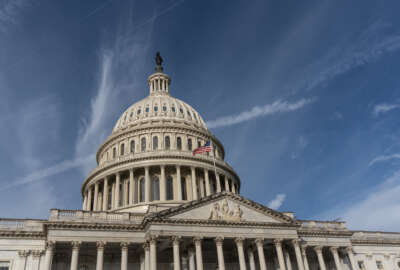Do feds really receive regular evil-tongue lashings?
Commentary: Federal Drive host Tom Temin wonders what qualifies as \"fed-bashing\" these days, and what that means for workforce morale.
Fed-bashing might headline a lot of articles and interviews, but I question whether fed-bashing exists as a palpable phenomenon. Or whether it’s loud or prominent enough to justify hang-dog morale on the part of federal employees. Two thousand years ago, the Talmudic scholars cautioned against the “evil tongue” — disparaging of people by the spoken word. Many cultures share this orientation. When I used to teach the Dale Carnegie course, the very first human relations principle instructors were to convey to class members was, “Do not criticize, condemn or complain.” Given the level of discourse nationally, you’d think hardly anyone thinks that way. The “sticks and stones…” ditty lacks truth — words and name-calling can and do cause damage. Like many readers, I’m addicted to the comments sections in big publications. Political stories, harshly polemic columns, and sensational reports with heavy cultural overtones often generate thousands of comments. Some of them I read with my hand close to covering my eyes, as if watching a slash-and-guts movie. So vitriolic the posts often get. To qualify as fed bashing, I think statements or published material must meet certain criteria:
- It originates in the mainstream, not from the fringe. Taken as a whole, fringe groups hate everything. So anti-government raves coming from Timothy McVeigh groupies or The Westboro Baptist Church don’t count. Or…
- …it lumps every federal employee in when using particular ones, like some of the failed managers at Veterans Affairs, as if everyone at VA was bad. And…
- … its source carries sufficient standing or prestige with ordinary people such that they might take away from the disparagement the distinct possibility that federal employees really are all bad.
Many statements that might strike the ear as fed-bashing really aren’t. A story in the Wall Street Journal the other day detailed how administrative judges at the Securities and Exchange Commission prevail in 90 percent of the cases. That leads to the legitimate concern that the rulings don’t come from an impartial judiciary but rather from agency employees judging the charges brought by friends and colleagues. I’m not issuing my own opinion here, just pointing out the arguments. So if someone were to say, as someone inevitably will, “I don’t want some bureaucrat deciding a case brought by another bureaucrat, I want a honest-to- goodness judge!” I judge that not to be fed-bashing but rather an opinion, however clumsily stated, that a powerful administration lacks sufficient oversight and is prone to conflict of interest. Congress remains a rich source of what some construe as fed-bashing. Regular debates over federal pay and benefits can produce the feeling of being bashed. But think about this: Compensation of employees in every industry, public or private, ultimately respond to markets. In my career of close to 40 years, I’ve twice had pay cuts imposed by employers citing financial or economic conditions. Like millions of worker bees, I’ve seen changes in pension plans, 401K contribution formulae and health care benefits — rarely for the better. Lord knows the media, whatever that is, gets regularly bashed (often in the media) — and often deservedly so. I bash it myself sometimes! My advice for federal employees who think they hear fed-bashing: Shrug if off. Out of 319 million Americans, probably 300 million only occasionally even think about the federal government. The rest have opinions falling somewhere on the scale from the John Birch Society to the Socialist Party of America. If you work in the public sector, you operate in close quarters and at the behest of politicians and their appointees who, in many cases, signed up precisely because they thrive on conflict. So sometimes you’ll get splashed with what hits the fan. Most of the time, it’s not aimed at you. Sometimes you gotta duck.
Tom Temin is host of The Federal Drive, which airs 6-9 a.m. on Federal News Radio (1500AM). This post was originally written for his personal blog, Temin on Tech.
Copyright © 2025 Federal News Network. All rights reserved. This website is not intended for users located within the European Economic Area.
Tom Temin is host of the Federal Drive and has been providing insight on federal technology and management issues for more than 30 years.
Follow @tteminWFED






